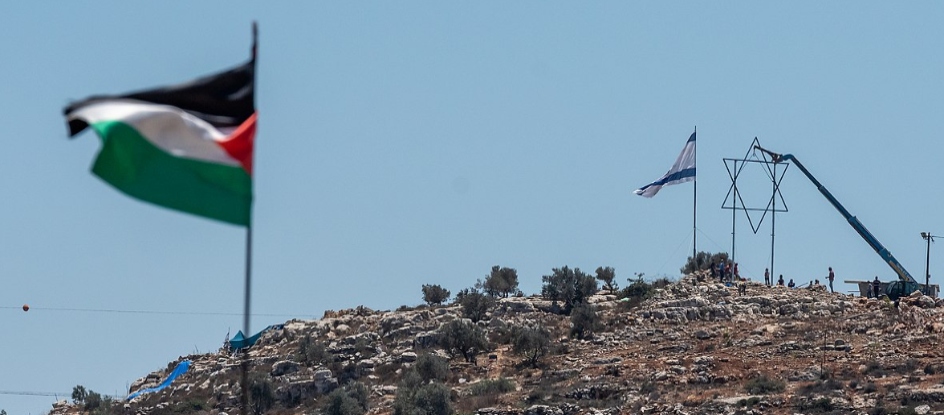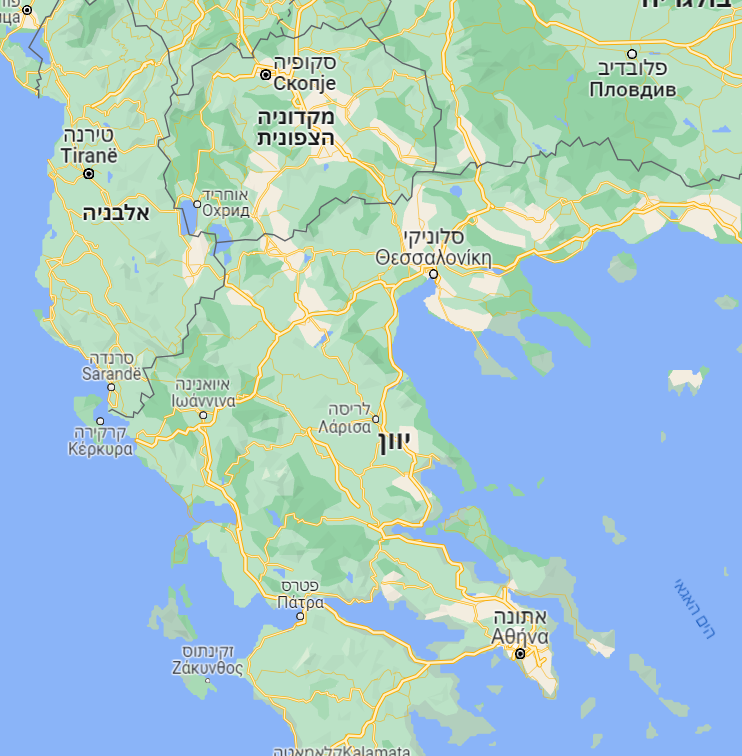Israel must make it clear to the world that any discussion regarding a future Palestinian state is officially over

In the days and weeks following the horrific massacre in the Negev, it seemed that the international community would finally allow Israel to take off its proverbial gloves and deal with the Palestinian nationalist threat once and for all. But despite the parade of Western leaders who came to Israel to support Israel’s righteous campaign against Hamas-ISIS, too many international actors are still beholden to the two-state delusion.
Alongside President Biden’s passionate speeches about his support for Israel, and alongside the US administration’s promise to provide any and all necessary military aid, the Biden administration continues to presume that the day after the war Israel will return to the familiar track of negotiations with the PA regime in Ramallah. At the same time that Israel’s western allies are rightly providing any diplomatic support necessary to ensure that Israel wins the war, they have been actively working to see to it that Israel “loses the peace” by acquiescing to the creation of a Palestinian state that will spell nothing but disaster for Israel and the Jewish people.
President Biden clarified, for example, that “Hamas does not represent the Palestinian people.” French President Macron paid a visit to Holocaust denier Abu Mazen in Ramallah, along with his solidarity visit to Israel. British Prime Minister Rishi Sunak also visited Ramallah and repeated the hollow mantra of supporting the two-state solution.
Even before the dust of the war settles, Israel must make it clear to the world that after the terrible massacre we experienced, any future political negotiations will be conducted within entirely new confines. This need arises all the more in light the Palestinian Authority’s despicable tacit support for Hamas’s war crimes, including providing financial rewards to the terrorists who carried out the massacre.
The time has come to deny altogether the fictitious Palestinian national narrative and call a spade a spade – the so-called “Palestinians” are merely a small fraction of the Arabic-speaking Sunni Muslim world, they do not constitute a separate ethnic or religious group, and in any case the need to establish a new political entity for them is not a national imperative but rather a demographic necessity. This critical distinction will unmask the Palestinian national movement for the charade that it is – a tool designed to destroy Israel and take away any kind of sovereignty from the Jewish people. One Western leader who showed signs of recognizing this basic truth was the Chancellor of Austria, who in a conversation with Israeli Opposition Leader Yair Lapid said that the chant “from the river to the sea Palestine will be freed” would be considered incitement to murder in his country.
Israel should take note of the precedent set by its East Mediterranean neighbor Greece, and how it addressed the issue of the Macedonian national movement that developed, just like the PLO, under the influence of the Soviets. As explained on the website of the Greek Ministry of Foreign Affairs, the issue arose in 1991 when the “Former Yugoslav Republic of Macedonia” separated from Yugoslavia and declared its independence under the name “Republic of Macedonia”.
From the perspective of the Greeks, the very use of the name “Macedonia” was a red flag. According to Greece, the term originates from a Greek word and refers to the kingdom and civilization of the ancient Macedonians who belong to the Hellenic nation, and constitute, as they put it, “an indisputable part of the historical and cultural heritage of Greece”. Geographically, as the Greek government explains, the term refers to a larger area that covers the current territory of various Balkan countries, most of which is located in Greece, while only other small parts of it are located in the territories of the countries of North Macedonia, Bulgaria and Albania.
The issue first surfaced after World War II, when Marshal Tito separated from Serbia from the area that until then was called Vardar Banovina (i.e. the current Republic of North Macedonia), gave it the status of a federal component of the Yugoslav Republic and the name “People’s Republic of Macedonia”. At the same time, Tito began to cultivate the idea of a separate and distinct “Macedonian nation”.
According to Greece, these moves were an attempt to establish future territorial claims in the geographical area of “Greater Macedonia” and to ensure access to the Aegean Sea. Tito’s ambitions in the region were already confirmed in 1944 when he declared that his goal was to reunite “all the parts of Macedonia that were dismantled in 1912 and 1913 by the Balkan imperialists”.
In response, the American State Department sent a cable to US foreign missions in December 1944, signed by Secretary of State Edward Stettinius, which stated, among other things, that:
“The Government of the United States takes the view that references to a ‘Macedonian Nation’, a ‘Macedonian Mother Homeland’ or a ‘Macedonian national conscience’ are unjustified demagoguery, as they do not reflect any political reality. It detects in them the resurgence of a possible guise concealing underneath aggressive plans against Greece“
Against this historical backdrop, the Greeks explain, the former Yugoslav Republic of Macedonia declared its independence in 1991 and justified its existence through the artificial concept (according to the Greek government) of the “Macedonian nation”.
Greece reacted firmly “to the usurpation of its historical and cultural heritage and the creeping territorial claims… of the new then country”, and the issue came before the UN Security Council. For the sake of peaceful and good neighborly relations in the region, the Security Council adopted two resolutions [817 (1993) and 845 (1993)] which recommended finding a quick solution to the name dispute and other issues. In 1993, according to the recommendation of the Security Council and following the decision of the General Assembly, Greece agreed for its neighbor to join the United Nations under the temporary name “The Former Yugoslav Republic of Macedonia”.
The crisis came to an end only in 2018, when the parties agreed that the country could call itself the “Republic of North Macedonia”. The agreement included details such as changing the names of airports and roads, agreements regarding the use of ancient Greek symbols and the fact that the modern North Macedonian language is not the language of ancient Greece and does not confer an affinity to ancient Greece, as well as a clarification that the new state claims sovereignty only over “North Macedonia”, and does not claim sovereignty or ascribe to itself a cultural affinity to the Greek region of the region of Macedonia.
The final agreement further stated that both parties confirm the existing common border as an inviolable international border, emphasize a commitment to respect the sovereignty, territorial integrity and political independence of the other party, and undertake that nothing in their constitution, as it is currently in force or will be amended in the future, can be interpreted or constitute grounds for interfering in the internal affairs of the other party “in any form and for any reason, including to protect the status and rights of any person who is not its citizen”. It was also agreed to take measures to ban activities and propaganda that could incite nationalism and hostility.
It was also agreed to establish a joint committee of experts for historical, archaeological and educational matters, which will also examine the school textbooks and all the reference material for the school, and among other things will remove content such as maps of “Greater Macedonia”.
The North Macedonians never sent suicide bombers to blow up buses in Athens. There were never North Macedonians who slaughtered Greek children in their beds. And there were never North Macedonians who sent terrorists to rape and pillage in the Greek countryside. Still, the Greek government had basic self-respect and understanding of where to draw the line with the international community and with its neighbors.
Unfortunately, Israel did not wake up in time to the existential threat posed by the Palestinian national movement, but it is better that to wake up late than to continue to remain asleep on this issue. Until now, the official Israeli policy has mainly focused on minimizing damage on the ground: demanding security supervision by the IDF in the West Bank, defensible borders, control of airspace, crossings, etc. The horrible massacre of October 7th was a sober reminder that what motivates terrorism is nationalist aspirations, and what will prevent terrorism is to put those the nationalist narratives to bed once and for all.
In additional to putting an end to the Palestinian nationalist narrative, Israel must insist that any entity established for the Arabic-speaking Muslims in Judea, Samaria and Gaza can be a civil autonomy only and must remain under full Israeli sovereignty. As I demonstrated in a recent paper I co-wrote with my colleagues in the IDSF, it is perfectly accepted in international politics, including in western democracies, for one entity to be under some form of “special sovereignty” of another country. Like with the case of the naming issue, Israel has a recent international precedent for this demand. In 2020, in President Donald Trump’s “Proclamation on Recognizing The Sovereignty Of The Kingdom Of Morocco Over The Western Sahara”, the US President declared that:
“The United States affirms, as stated by previous Administrations, its support for Morocco’s autonomy proposal as the only basis for a just and lasting solution to the dispute over the Western Sahara territory. Therefore, as of today, the United States recognizes Moroccan sovereignty over the entire Western Sahara territory and reaffirms its support for Morocco’s serious, credible, and realistic autonomy proposal as the only basis for a just and lasting solution to the dispute over the Western Sahara territory. The United States believes that an independent Sahrawi State is not a realistic option for resolving the conflict and that genuine autonomy under Moroccan sovereignty is the only feasible solution.”
So, to, Israel must begin to demand international recognition for Israeli sovereignty in Judea, Samaria, and Gaza, and call on the groups of Arabs living there to accept an Israeli autonomy proposal.
If the international community gave in when Morocco insisted on no more that autonomy for the Western Sahara, and when Greece insisted on forcing the sovereign nation of Macedonia to change its name, then the international community will also accept Israel’s position that the Arabs of Judea, Samaria, and Gaza accept autonomy and give up the invented Palestinian narrative. If it turns out that there is no partner on the other side who will accept Israel’s new parameters, then they should not be given any geopolitical entity at all.
Adv. Elie Kirshenbaum is a lawyer in Israel and New York, owns a private law office and is a researcher of international law in the field of international dispute resolution




